 MyDogBreeds
MyDogBreeds Ariege Pointer is originated from France but Basque Shepherd is originated from Spain. Ariege Pointer may grow 6 cm / 3 inches higher than Basque Shepherd. Both Ariege Pointer and Basque Shepherd are having almost same weight. Both Ariege Pointer and Basque Shepherd has same life span. Both Ariege Pointer and Basque Shepherd has almost same litter size. Ariege Pointer requires Low maintenance. But Basque Shepherd requires Moderate maintenance
Ariege Pointer is originated from France but Basque Shepherd is originated from Spain. Ariege Pointer may grow 6 cm / 3 inches higher than Basque Shepherd. Both Ariege Pointer and Basque Shepherd are having almost same weight. Both Ariege Pointer and Basque Shepherd has same life span. Both Ariege Pointer and Basque Shepherd has almost same litter size. Ariege Pointer requires Low maintenance. But Basque Shepherd requires Moderate maintenance
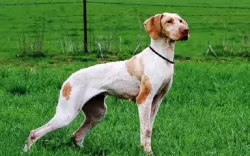 The Ariege Pointer is a French hunting dog, coming from the Ariegeois region of France.
The Ariege Pointer is a French hunting dog, coming from the Ariegeois region of France.
Known as the Ariege Pointing Dog, French Pointer or Braque de l’Ariege, these dogs came from the old French Braque dogs that were crossed with the orange and white Southern Braques.
It was in 1990 that a team of breeders decided to devote themselves to the breed’s survival. The Braque de l’Ariege was recognized by the United Kennel Club in 2006.
 The Basque Shepherd is one of the oldest dog breeds. With this Spanish dog, you’ll find paintings dating back 12,000 years ago. The Basque Shepherd is known as a landrace breed, which means the dog hasn’t gone through the same selective breeding programs as what other breeds have. Landrace breeds have more variations in appearance and temperament than regular breeds.
The Basque Shepherd is one of the oldest dog breeds. With this Spanish dog, you’ll find paintings dating back 12,000 years ago. The Basque Shepherd is known as a landrace breed, which means the dog hasn’t gone through the same selective breeding programs as what other breeds have. Landrace breeds have more variations in appearance and temperament than regular breeds.
The Basque Shepherd has 2 distinct varieties, the Gorbeiakoa and the Iletsua. The smooth-haired Gorbeiakoa has a softer coat that is fairly short while the rougher-haired Iletsua has a lighter coloured coat, and unlike the Gorbeiakoa, the ears are not typically erect.
Even though this is an ancient breed of dog, only the Royal Canine Society of Spain recognizes the breed with the two varieties, and in January 1996, the two breeds - Iletsua and Gorbeikoa – were recognized.
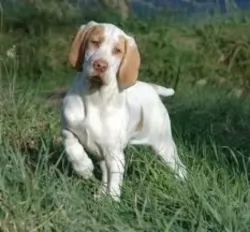 The Ariege Pointer has always been a dog kept essentially for hunting and not as a companion dog. He stands between 55 – 67cm and weighs 25 – 30kg.
The Ariege Pointer has always been a dog kept essentially for hunting and not as a companion dog. He stands between 55 – 67cm and weighs 25 – 30kg.
He is an attractive looking dog with quite a large head while the body is sleek and slender to look at. The ears are quite large and are floppy while the tail is traditionally docked to give him that distinctive look. These days the tail is often left long and hangs downwards.
The coat is short, single and rough and is white with tan or orange patches. The coat can also be speckled or ticked.
The Ariege Pointer is a hunting dog who is friendly towards strangers and therefore won’t make a particularly good watchdog.
These dog are lively, independent and good natured and they make excellent companion dogs. They are fairly docile and and get on well with children and pets in the home. Just like with any other dog, they need to be trained and socialized early.
 The Basque Shepherd is a strong, well proportioned dog with brown eyes and medium sized ears, which sometimes have folds. This medium-to-large dog has a beautiful fawn coat of medium-length hair that can be straight or slightly wavy. He has a long feathery tail that will wag readily when he sees his owner. You’ll find other colors for the Basque Shepherd shared between the two varieties - a yellow orange or copper coat with other shades being red, blue and black. His hair is shorter on the head and he doesn’t battle with hair over the eyes.
The Basque Shepherd is a strong, well proportioned dog with brown eyes and medium sized ears, which sometimes have folds. This medium-to-large dog has a beautiful fawn coat of medium-length hair that can be straight or slightly wavy. He has a long feathery tail that will wag readily when he sees his owner. You’ll find other colors for the Basque Shepherd shared between the two varieties - a yellow orange or copper coat with other shades being red, blue and black. His hair is shorter on the head and he doesn’t battle with hair over the eyes.
The Basque Shepherd is a highly intelligent dog and also very energetic. Of the two different kinds of Basque Shepherd, it is the Gorbeiakoa which is the more outgoing. The dogs will require a firm owner and they thrive on the discipline when it is combined with lots of with lots of exercise and activities.
The Basque Shepherd is generally friendly with people, if not a little reserved with strangers. He gets on well with children and other pets in the home, although socialization and training will be necessary to bring out their best.
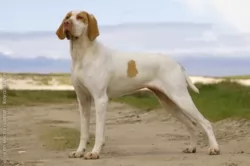 The Ariege Pointer has always been an excellent pointing- and hunting dog. When it comes to being a family pet, he puts his hunting skills aside and becomes a loyal, loving, friendly pet.
The Ariege Pointer has always been an excellent pointing- and hunting dog. When it comes to being a family pet, he puts his hunting skills aside and becomes a loyal, loving, friendly pet.
They are considered to be rare dogs, and were at one time bordering on extinction. Those who have owned one of these hunting dogs will be glad to know that they are no longer considered endangered. They’re not your friendly, social kind of dog that you find in other dog breeds, but with training and socialization he will make a fine companion and family friend.
 The dog is well suited to being a family pet, loving to spend time with family, being a people-oriented breed. He gets on well with children as well as other pets in the home, but can be reserved with strangers.
The dog is well suited to being a family pet, loving to spend time with family, being a people-oriented breed. He gets on well with children as well as other pets in the home, but can be reserved with strangers.
He doesn’t have an aggressive nature, and yet he does what it takes to protect his beloved human family.
He is full of energy, hardy and tough. He loves his human family and wants to be included in all their activities. He is energetic though and as a responsible dog owner, you want to make sure that your Basque Shepherd has enough space to run.
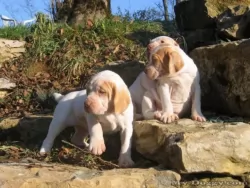 The Ariege Pointer is a working dog breed, used for hunting and retrieving prey. With good care the dog can live to be a good 12 – 15 years of age.
The Ariege Pointer is a working dog breed, used for hunting and retrieving prey. With good care the dog can live to be a good 12 – 15 years of age.
However, with every dog breed there are common dog diseases to watch for. This dog has long floppy ears and these can get damp and will need to be cleaned and dried regularly otherwise the long ears can be prone to infection.
Apart from being prone to health issues such as an ear infection, you want to be aware of very common dog ailments such as hip dysplasia which can cause lameness in your dog.
Whatever illness your dog has, and you see he isn’t acting his usual self, get him to the vet for a check-up and then make sure that all treatment and medication prescribed is adhered to.
 Because this is an ancient breed, the Basque Shepherd doesn’t have to contend with genetic health problems such as more modern breeds. Just like other dogs though, he could be prone to certain conditions such as hip dysplasia, eye problems, ear infections and cancer. As a larger breed, he may also be prone to bloat.
Because this is an ancient breed, the Basque Shepherd doesn’t have to contend with genetic health problems such as more modern breeds. Just like other dogs though, he could be prone to certain conditions such as hip dysplasia, eye problems, ear infections and cancer. As a larger breed, he may also be prone to bloat.
Breeds with floppy ears, such as the Basque Shepherd will be more prone to developing ear infections. To prevent infection, keep his ears clean and dry. If you’re unsure, the vet can guide you how- and what to do.
This is a disease which is common to other dog breeds too and not just the Basque Shepherd. This condition affects the hip joints and can result in chronic pain for the dog and also lameness. Checking your dog’s weight is important and the pain can be managed with medication.
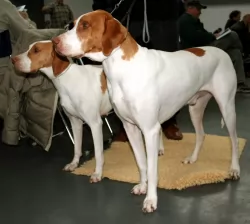 Your attractive Ariege Pointer will give birth to 2 – 8 puppies. If you don’t want puppies, then spaying or neutering is excellent and can actually have many health benefits for your pet.
Your attractive Ariege Pointer will give birth to 2 – 8 puppies. If you don’t want puppies, then spaying or neutering is excellent and can actually have many health benefits for your pet.
This dog with its short coat requires very little maintenance, and a good brush twice a week will ensure the coat remains glossy and shiny, giving you the chance to also check for fleas and ticks.
Don’t just assume every dog has bad breath. Bad breath can be indicative of dental disease, and dental problems can cause all kinds of other illnesses within the body. Make sure that while your pet’s teeth are healthy, that you brush them 2 or 3 times a week with special canine toothbrush and toothpaste.
The Ariege Pointer requires regular exercise as it is a lively, energetic dog. He can adapt to life in the city or the country, but ideally he needs a place with a large garden.
Wherever you keep him as a pet, make sure you take him for walks every day and that you play ball- or rope games with him. Ignoring his exercise needs will turn him into a bored, frustrated pet, and that isn’t fair towards him.
Make sure you choose good quality commercially manufactured foods for him. Adding in some home-made food to his kibble such as cooked brown rice, vegetables and chicken will be wonderfully good for him.
Every dog will require some raw meat added into his diet from time to time. Many skin diseases can be treated by adding in raw meat. After all, before dogs were domesticated they lived on raw meat, and including this ingredient back into their diet guarantees to make a remarkable difference in terms of good health.
 This is a medium to large breed dog and he should therefore be fed a high quality food which has been formulated for medium to large breeds. Because he is a herding dog, you might want to also look at an active-dog or working-breed formula to supply him with that much needed energy.
This is a medium to large breed dog and he should therefore be fed a high quality food which has been formulated for medium to large breeds. Because he is a herding dog, you might want to also look at an active-dog or working-breed formula to supply him with that much needed energy.
The Basque Shepherd’s coat is lush and long with either straight or wavy hair. Regular brush at least twice a week will maintain the coat, get rid of loose hair and prevent fleas.
The Basque Shepherd is an intelligent breed that will respond well to socialization and training. He is a breed that loves sports too because of this very high energy levels. You need to be careful with the Basquae Shepherd around small children, not because he is aggressive in any way, but because he is highly active, and his exuberance and boisterous antics could see him unintentionally knocking over small children.